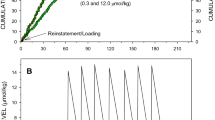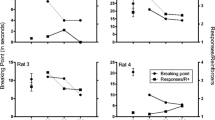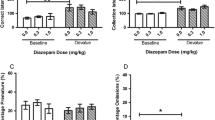Abstract
Rationale. Psychosis and psychotomimetic drugs result in a disorganisation of the structure of thought and behaviour. Normalising these is one of the objects of antipsychotic therapy, and methods for predicting such a therapeutic effect would be of value.
Objective. The effects of a number of psychotomimetic agents were examined on the way in which rats distributed responding over two response levers using two different procedures, to assay their effects on behavioural organisation. Previously, amphetamine has been found to increase response switching using these schedules.
Methods. In the first, the random reinforcement procedure, one of the two levers was selected at random as "correct", and responses on this lever were reinforced with food under a random ratio schedule. No signal was given to distinguish the levers. Responding could also result in the food tray being illuminated, but no food pellet was delivered ("no-food" event). Responses on the second lever ("incorrect") had no programmed consequences. After each food delivery or "no-food" event the levers designated as "correct" and "incorrect" were reassigned at random, and the rat had to open the food tray to restart the schedule. In the second procedure, the rats were required to make 21 responses before a switch between the two levers resulted in food delivery [Fixed Ratio (FR) 21-switch]. The responses making up the FR could be distributed freely between the two levers.
Results. Phencyclidine (PCP), scopolamine, caffeine and ethanol increased switching under the random reinforcement procedure, but (±)-2,5-dimethoxy-4-iodoamphetamine hydrochloride (DOI) and atropine did not. PCP, caffeine, lysergic acid diethylamide (LSD) and atropine increased switching under the FR21-switch procedure, but ethanol did not. The increases in switching produced by PCP, LSD and the anticholinergics were accompanied by marked reductions in response rate, whereas those produced by amphetamine and caffeine were not. The effects of amphetamine, and PCP were strongly dependent on the baseline probability of switching, those of atropine and caffeine moderately so, and those of LSD and ethanol only weakly so.
Conclusions. Of the agents tested, psychomotor stimulants appear to produce the most selective increases in switching. The procedures described here may be useful for assaying the disorganisation of behaviour produced by other psychotomimetics and may have value in the detection of novel antipsychotic drugs.
Similar content being viewed by others
Author information
Authors and Affiliations
Additional information
Electronic Publication
Rights and permissions
About this article
Cite this article
Evenden, J. The effects of psychotomimetics and psychomotor stimulants on two schedules promoting response switching in the rat. Psychopharmacology 163, 381–390 (2002). https://doi.org/10.1007/s00213-002-1184-1
Received:
Accepted:
Issue Date:
DOI: https://doi.org/10.1007/s00213-002-1184-1




